Home » Posts tagged 'T. Mróz' (Page 4)
Tag Archives: T. Mróz
Plato’s Adventures with Censorship in Poland
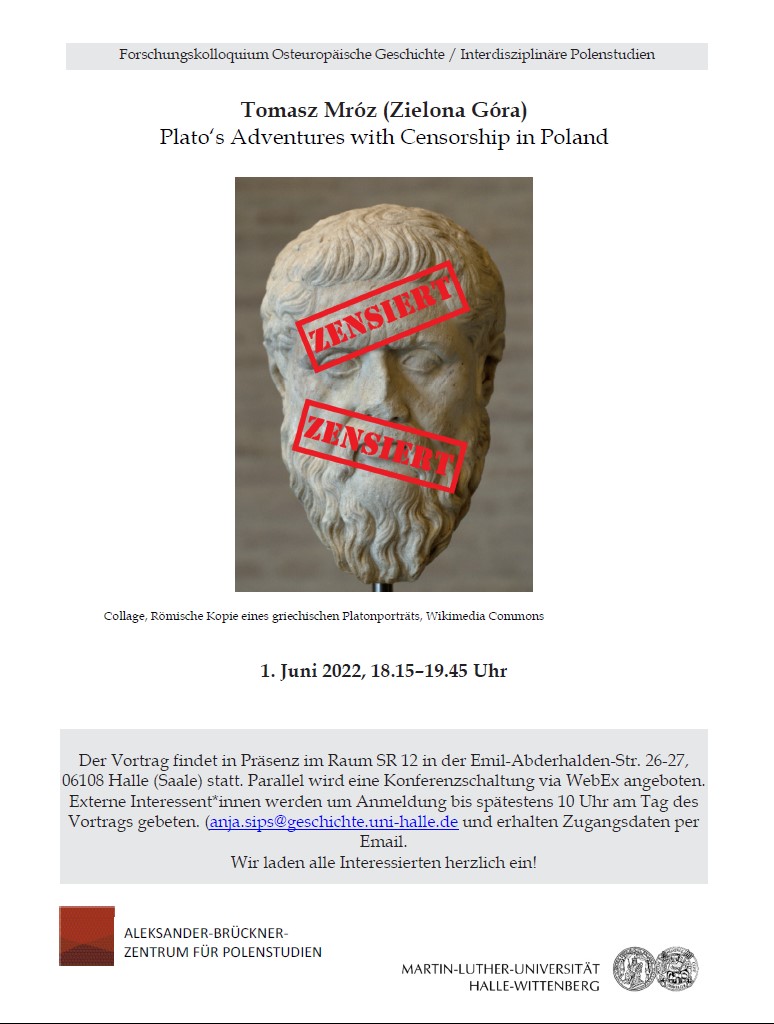
On June, 1st, a talk by Tomasz Mróz was delivered at the Interdisziplinäre Kolloquium Osteuropäische Geschichte / Polenstudien (Martin-Luther-Universität Halle). The topic of the presentation was the interference of various types of (broadly understood) censorship with Plato scholars and research on Plato in Poland. T. Mróz discussed three (and a half) cases of such interference. The talk was a supplemented and developed version of one of Mróz’s previous papers.
The first case of censorship was relatively harmless, for only one word, namely: socialism, was removed from the title of Wincenty Lutosławski’s book, Plato as a Creator of Idealism [and Socialism], (Warsaw 1899). Imperial Russian authorities in Warsaw removed the word “socialism” from the title and from the table of contents, without even looking into the text of his book on Plato, for “socialism” occurs on many pages, being – in Lutosławski’s view, a natural consequence of idealism.
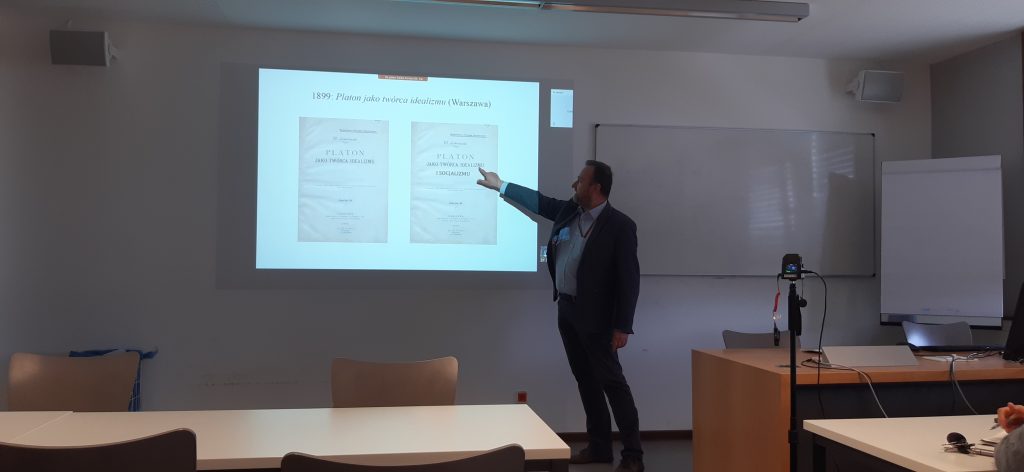
Stanisław Lisiecki represented another case of broadly understood censorship. He was an enthusiast of Plato and a translator of his dialogues, but only his Republic saw the light of day in the interwar period, while all the remaining dialogues were left unpublished in the manuscripts. His leaving the clergy and Roman Catholic church was the most probable the reason of his difficult situation in Polish academia, for some scholars were unable to accept him as a colleague and assess his works without religious prejudice. As a result, his works were not published, but some justice in this regard has been recently done by the members of the AΦR research group.
Władysław Witwicki was more succesful in his translations of Plato’s works. Soon after the Word War II he managed to publish a small book on Plato (Plato as an Educationalist, 1947) and a translation of Plato’s Republic (1948). In the book and in his commentaries to Plato’s text, he compared the post-war reality of Poland and Plato’s political project to a concentration camp, great monastery, or a totalitarian state. Some of his remarks were censored and the second edition of the Republic (1958) appeared in print in an ideologically “corrected” version.
As the additional “half” of the censorship cases, Witwicki’s struggle with his sister, who was a Catholic nun, were presented. She tried to convince him not to criticize Catholicism in his commentaries, but he replied to her with a short comic story depicting his and Plato’s imaginary meeting with her, and Plato’s escape from holy water.
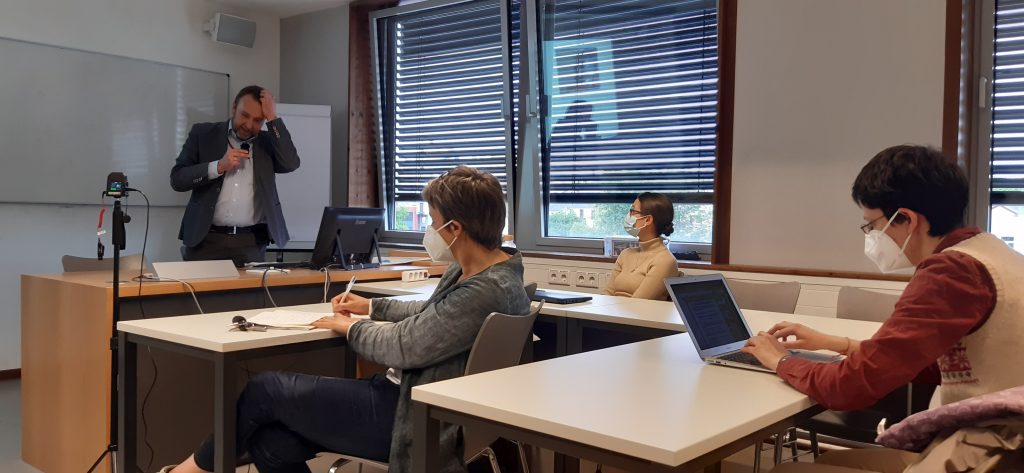
Thanks to the fact that the audience consisted of specialists in East-European history, in philosophy and in the historiography of philosophy, a wide spectrum of questions appeared and the author did his best to satisfy multi-oriented demands of the public.

T. Mróz’s stay in Halle was sponsored by Aleksander-Brückner-Zentrum für Polenstudien from the funds of Deutscher Akademischer Austauschdienst (DAAD).
Plato, Moses Mendelssohn, Jakub Tugendhold and Plato’s “Phaedo”
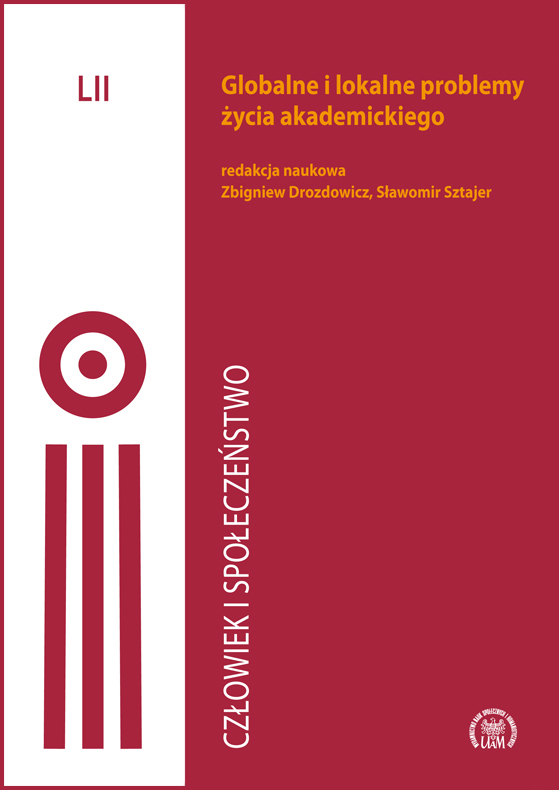
A paper on a metamorphosis of Plato’s Phaedo, from its original form through Moses Mendelssohn’s (1729-1786) Phädon to its Polish translation by Jakub Tugendhold (1794-1871), was published in a journal of Adam Mickiewicz University in Poznań, “Człowiek i Społeczeństwo”.
Tomasz Mróz in his paper discusses M. Mendelssohn’s work Phaedo and its Polish translation which was published in 1829 by J. Tugendhold. Although this book did not exert impact on Polish philosophy, Tugendhold, the translator, aimed to use Mendelssohn’s biography and his Phaedo as an instructive example for those representatives of Jewish community who wanted to free themselves from isolation and undergo social and economic, though not religious, assimilation into their Polish and Christian surrounding.
A brief comparison of Plato’s and Mendelssohn’s Phaedos was included in this paper. Polish translator’s aims were also discussed, for his target audience was Jewish community in Polish society. Tugendhold was the adherent of haskalah and he spared no effort to improve the existence of his compatriots and to inspire them to join in modern societies without losing their religious autonomy.
Philosophical content of the Phaedo, the arguments on the immortality of the soul, in both versions, Plato’s and Mendelssohn’s, reinforced Tugendhold’s views, as they were the example of the fact that Judaism and Christianity, not to mention Plato, are ultimately based on the same belief, on the immortality of the soul.
Full paper, in Polish, can be downloaded from the journal’s website.
AΦR at Classical Studies Workshop in Greece
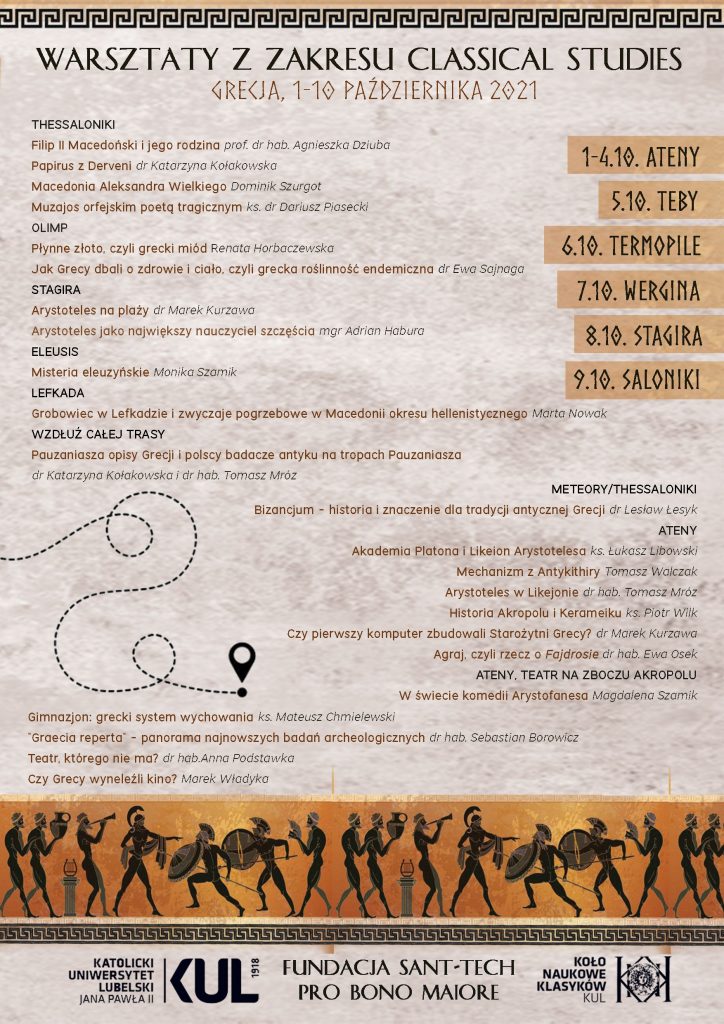
Two members of AΦR Group, together with an AΦR friend, took part in Classical Studies Workshop in Greece. This tour event took place in the first ten days of October and was organised by The Sant-Tech Foundation in co-operation with Catholic University of Lublin (KUL).
It was an unforgettable tour of Greece from Athens to Thessaloniki, including Delphi, Marathon, Meteora, Pella, Stageira and many more places of archeological interest, many of which being extremely important for philosophers and historians of philosophy, e.g. Plato’s Academy, Aristotle’s Lycaeum, ancient Stageira or Nymphaeum in Mieza. The whole stay and the journey were carefully planned by Katarzyna Kołakowska and Lesław Lesyk (both of KUL and Sant-Tech Foundation), who smoothly adapted the workshop’s schedule to unexpected conditions.
The chronological order of the papers delivered by participants from Zielona Góra is: 1) Was the First Computer Designed by the Greeks? (M. Kurzawa, at the footsteps of the National Archaeological Museum of Athens; third from the left in the photo below). The speaker focused on the history of research on the Antikythera mechanism, which is preserved in this Museum, and its unbelievable construction. 2) Aristotle in the Lycaeum (T. Mróz, in the archeological site of… Aristotle’s Lycaeum; first on the right) discussed briefly the excavations in this location and presented the outlines of the history of the Philosopher’s school.
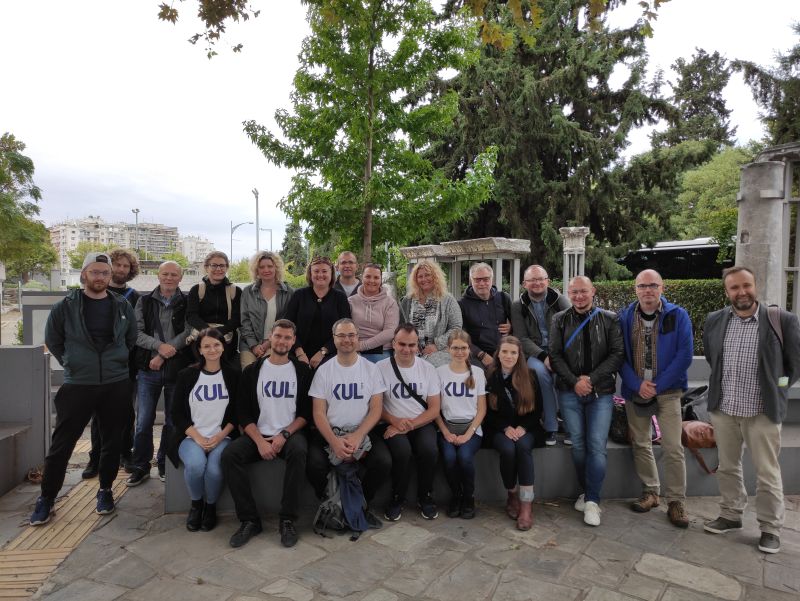
Due to unfavourable weather conditions the following presentations were delivered en route to Thessaloniki, that is, on the bus: 3) Aristotle on the Beach (M. Kurzawa) was a paper devoted to Aristotle’s works in natural sciences and focused on his anecdotal scientific curiosity which gave rise to his theories, which still amaze us to this day. 4) Aristotle as the Greatest Teacher of Happiness (A. Habura; second from the left in the photo). The speaker presented the most essential Aristotle’s instructions on achieving happiness from the Nicomachean Ethics and highlighted their universal character, which was additionally substantiated by the studies of W. Tatarkiewicz, a recognised Polish historian of philosophy and ethician, on the same subject. 5) Polish Historians of Philosophy and Classics Scholars on Their Journeys to Greece (T. Mróz). This was rather a loose speech than academic paper and it presented three Polish scholars (W. Dzieduszycki, T. Sinko, W. Witwicki) and their memories of visiting historical places, some of which at the times of their journeys looked differently then they do today, and their observations on modern Greeks, which in turn appear sometimes to tally with today’s impressions of Greece.
Lewis Campbell and His International Connections

Studia Historiae Scientiarum, an annual journal published by Polish Academy of Arts and Sciences, includes a section Science beyond Borders. In 2018 a paper by Tomasz Mróz was published there on Lewis Campbell’s (1830–1908) correspondence held in Peterhouse Library, Cambridge.
The paper presents L. Campbell, his research on Plato, and the collection of letters sent to this Scottish scholar by: James Martineau (1805–1900), William Hepworth Thompson (1810–1886), Paul Shorey (1857–1934), Wincenty Lutosławski (1863–1954), Eduard Gottlob Zeller (1814–1908), Franz Susemihl (1826–1901), and Theodor Gomperz (1832–1912). This collection supplements the knowledge of the research on Plato’s dialogues at the turn of the 20th century, since Plato scholars in their letters touched on the issues relating to the methods and results of the research on the chronology of Plato’s dialogues. They made judgements concerning the works of other academics, they sent to each other their own publications, and reported on the progress of their studies. They also did not shy away from making personal remarks and communicating personal reflections.
Publishing this paper was preceded by a research stay in Cambridge in June and July 2016, which was sponsored by Lanckoroński Foundation. Additionally, archival materials from St Andrews University Library (Special Collections) supplemented the whole work.
The paper in Polish is available on the journal’s website here.
A View of Plato’s Paths in Poland
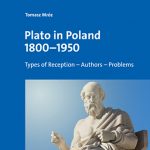
A lengthy, 480 pages, monograph book by T. Mróz was published in Academia Verlag’s series “Academia Philosophical Studies” as vol. 75. The title of the book is Plato in Poland 1800-1950. Types of Reception – Authors – Problems.
Some material from the book, including table of contents, is available on publisher’s website. The book attempts to make Polish Plato reception available to non-Polish readers. The years 1800-1950 cover essential phaenomena in modern Polish philosophy, for they encompass periods of reception of Western philosophical trends and the development of the Lvov-Warsaw school, neo-Messianism and neo-Scholasticism. The book discusses how each of these phaenomena contributed to interpreting Plato. The material is divided into three main parts focused on various types of reception.
The book is a final outcome of a project sponsored by Polish government within the National Programme for the Development of Humanities funding scheme. An essential collaborator in this project was Una Maclean-Hańćkowiak, who patiently edited the author’s style.

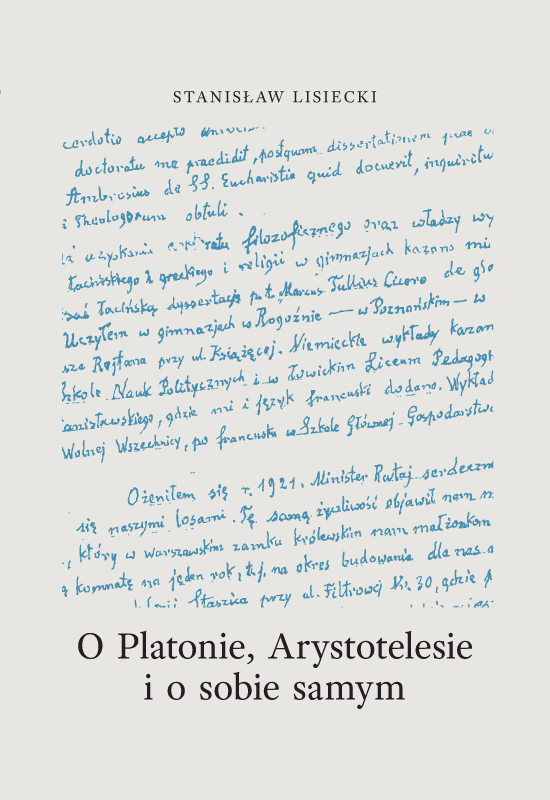
Recent commentaries